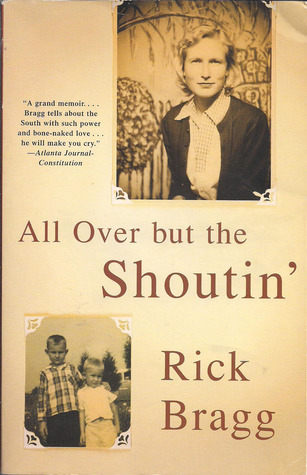
Bibliography
Bragg, Rick. All Over But the Shoutin'. New York: Vintage Books, 1997. Print.
image from:www.goodreads.com
My Thoughts
This was my book club read this month. This book has been on my "to read" list for about two years, so I was happy to have the deadline.
First, I enjoyed the storytelling. Rick Bragg creates a picture of his life that I can see. I wondered if I could understand it so well because
- I'm a Southerner.
- My great grandparents came to Texas from Alabama.
- Rick Bragg is just a gifted writer.
This is a memoir. In such, I'm sure the details are embellished or understated as Bragg remembers. I'm not calling Bragg a liar, but I know that memories form in a lens that might be tainted.
I liked how he told the good with the bad. His life was not magical or privileged. He lucked into some things and in others he worked hard. He does not try to blame his upbringing for his faults. He simply shows how people and events shaped who he is. "I am proud of who and what I am, just as proud of being the son of a woman who picked cotton and took in ironing as I am of working for a place like the New York Times. I have always believed that one could not have been without the other" (Bragg xx).
The book is divided into three parts. For the most part, the book is in chronological order. He writes in the prologue that his "momma believe that she failed [her sons]....She blames herself for that" (Bragg xix). He gives an example for each brother and even himself. Then, he writes about winning the Pulitzer "the highest honor our profession bestows. I hope she blames herself for that, too" (Bragg xx).
Some funny things he wrote:
"[she] might have told a lie, since she felt that another benefit of old age was that it gave you license to lie like a Republican" (Bragg xvi)
"When she got made she could cuss paint off the wall, cuss crows from the trees, cuss the lame straight and the wicked pure" (Bragg 32)
"Momma kept a garden, which sounds romantic to people who have never held a hoe" (Bragg 46)
squash were used as clubs (Bragg 47)
Bragg's older brother Sam would drop down to pray when he got in trouble. This kept him from getting beat! (Bragg 48)
"Telling stories was something you did on your porch. Journalism was too much like work, like digging taters" (Bragg 116)
Some things he wrote that I liked:
"Hungry does not have a color" (Bragg xvii).
He writes about the dialect and how his grandfather added "r" to words, so Edna became Ednar. I've heard this in my own family.
Overall, I think Bragg is a gifted story teller and carries on Southern traditions. He introduces the reader to people in this book just as he would introduce them---by explaining family connections. For example, "Abigail was a Hamilton, a Presley on her momma's side..." (Bragg 32). He uses colloquialisms that I understand. He is related to the same people I am. Even though I have never meet Rick Bragg, I feel as if I know him. This book was an enjoyable memoir in spite of the hardships.
The title reference is on page 12.
"When she got made she could cuss paint off the wall, cuss crows from the trees, cuss the lame straight and the wicked pure" (Bragg 32)
"Momma kept a garden, which sounds romantic to people who have never held a hoe" (Bragg 46)
squash were used as clubs (Bragg 47)
Bragg's older brother Sam would drop down to pray when he got in trouble. This kept him from getting beat! (Bragg 48)
"Telling stories was something you did on your porch. Journalism was too much like work, like digging taters" (Bragg 116)
Some things he wrote that I liked:
"Hungry does not have a color" (Bragg xvii).
He writes about the dialect and how his grandfather added "r" to words, so Edna became Ednar. I've heard this in my own family.
Overall, I think Bragg is a gifted story teller and carries on Southern traditions. He introduces the reader to people in this book just as he would introduce them---by explaining family connections. For example, "Abigail was a Hamilton, a Presley on her momma's side..." (Bragg 32). He uses colloquialisms that I understand. He is related to the same people I am. Even though I have never meet Rick Bragg, I feel as if I know him. This book was an enjoyable memoir in spite of the hardships.
The title reference is on page 12.
No comments:
Post a Comment